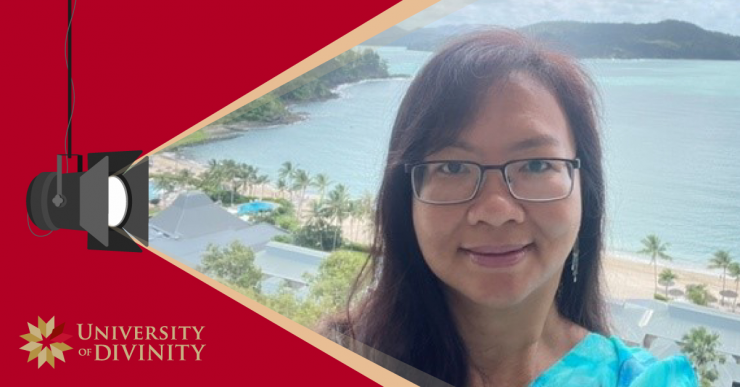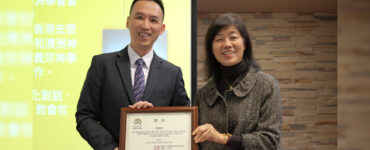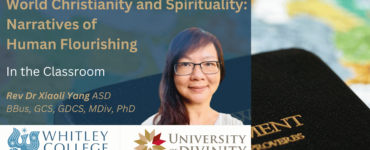Dr Xiaoli Yang is an Honorary Research Associate at the University of Divinity. She is an alumnus of the University, graduating with a Doctor of Philosophy in 2016 and a Graduate Certificate in Spirituality in 2017. Since then, she has published two dozen academic works including the most recent commentary on Titus in ‘An Asian Introduction to the New Testament’ and an article on Canaan Hymns. Her 2018 book, “A Dialogue between Haizi’s Poetry and the Gospel of Luke: Chinese Homecoming and the Relationship with Jesus Christ” has just been translated and adapted into Chinese for the first time.
Xiaoli, congratulations on the publication of a Chinese version (一场海子诗歌与路加福音的对话:中国人的回家之路与耶稣基督的关系)of your book, A Dialogue between Haizi’s Poetry and the Gospel of Luke: Chinese Homecoming and the Relationship with Jesus Christ. Tell us about what you explored in this research.
The Chinese publication is a dream becoming true. I do hope it will open up a new path for those in the Chinese-speaking world on a journey to find a true home.
This work addresses two issues that have been occupying missiologists for at least the last three decades – mission as dialogue and mission as inculturation, as a peer reviewer comments. Crossing the disciplines of theology, missiology and spirituality, the book has created an intercultural and interreligious dialogue between two classical documents or traditions: the poetry of Haizi, one of the most celebrated post-Mao poets in China, and the Gospel text of Luke. More generally, I made an effort to build various themes into lively intercultural conversations.
Why did you choose Luke’s Gospel for this research?
I like Luke for a few reasons. Luke is not just a theologian, he’s a doctor. This means his theology has universal implications because of a doctor’s compassion for all people. And so from a mission point of view, that’s really showing a universal concern. The Gospel also has a lot of artistry, such as the song of Mary, the song of Zechariah and many parables, and this helps with comparison to poetry.
The structure of Luke is also significant and has parallels with Haizi’s own homecoming journey. In Luke, the genealogy of Jesus traces his journey back to the very beginning of humanity, and this is paralleled in Haizi’s soul-search for home, which has roots in the Chinese Dao. Also, in Luke the table meal is a very essential component of Jesus’ journey, and this is also seen in the Chinese ideal of a family reunion occurring as a meal together around a table. The Lukan Jesus’ journey to Jerusalem is reflected in Haizi’s intellectual journey when post-Mao China opened up the West, and he researched philosophy and literature from the West, which he incorporated into his poetry.
Overall, I argue in my book that this common language and common humanity can become the basis of an ongoing conversation between the two.
What initially drew you to researching this area?
This is very much a part of my own life and journey. I only heard about Haizi after his dramatic death in 1989. After this, I was first given a small unofficial publication of his work, entitled “Land”, and I carried that in my backpack when I came to Australia as an overseas student. I read his poems and the beauty and poignant sentiment just like a piece of wood carried me in my own wandering journey in a foreign land.
Later, I became a Christian and I started working in ministry, pastoring, and working mission, and poetry was always in my mind. And so I started to think about how to integrate these two areas of my love. I know my generation uses and knows poetry, but it’s often been neglected in Western academic theology. So I decided to do a PhD to bring the two together.
Christianity is so often experienced and interpreted through a Western lens. How does a Chinese approach to Scripture and theology differ to what people might be used to in a Western tradition?
There is no one Chinese approach to theology or Scripture, just as there is no one Western approach to theology or Scripture. The Chinese population are spread around the world and their experiences are themselves diverse and complex, so anything you say about them or the approach they use is true at one time in one place.
However, as a generalisation, Chinese culture as a collective culture places emphasis on family, relationships, genealogy, the meal table, hospitality, communal sharing, yin-yang harmony, circulatory thinking, poetry, mystical insights, etc. So from this cultural standpoint we can find many resonances in the Scripture. But I don’t like to generalise because Chinese culture is being challenged by globalisation and migration so these standpoints are constantly changing and shifting in mobility.
Who has been an important part of your research journey?
So many people in the UD community have been an important part of my journey. Many friends have prayed, encouraged and supported me all the way. My language supporters helped me to refine my skills in writing academic English. My parents have always loved me unconditionally. And my dog has been so faithful and supportive sitting at my feet or snoring gently in his bed. I thank God for the ever-presence and ongoing inspiration on the journey.
What do you hope to research next?
I am currently exploring ‘lived poetics’, i.e., lived theology with poetic imagination, as a locus for the future of world Christianity. It is ‘lived’ because it is formed and shaped out of everyday lived experiences on a journey towards God, before one is immersed in a set of ideas and doctrines. It is ‘poetic’ because the nature of imago Dei is to intimately belong to and commune with the Creator by responding to the insistent calling to create and make something attractive and meaningful. ‘Lived poetics’ is the everyday creative and aesthetic expression on a constant move.
‘Lived poetics’ in the Global South/East aren’t articulated in the abstract or propositional form, as one does in Western academic studies, but these writers from the ground are still theologians in my view, because they are singing out of their raw voices and their lived experience in response to the gospel. Lived poetics is not just for the poets in the margin, it’s for everybody – we are made to speak and have a voice of beauty and meaning. When poetry is pregnant with spirituality it becomes a journey, and this journey can become missional – we are on this journey all together. It’s a pilgrimage towards God.
I am editing a special edition of Mission Studies on ‘Chinese Christian Identity’ and a book volume on ‘Chinese Christian Witness’ in Brill’s TMWC series. I am also writing a book on the theology of displacement, as well as a bible commentary, and planning to write something on theology of hymns in future. And of course the ongoing poetry writing is an expression of my spiritual contemplation alongside my vocation as a pastor and spiritual director.
Dr Yang’s book, A Dialogue between Haizi’s Poetry and the Gospel of Luke: Chinese Homecoming and the Relationship with Jesus Christ is available now through Brill.
Purchase from the publisherThe new Chinese version is available here.







Add comment